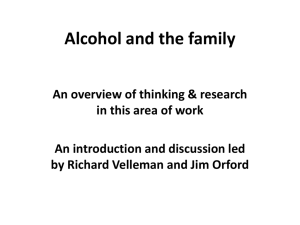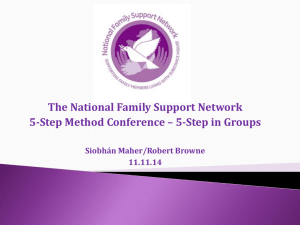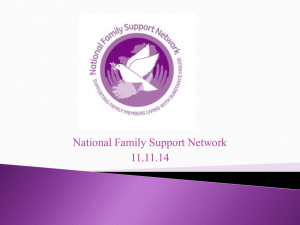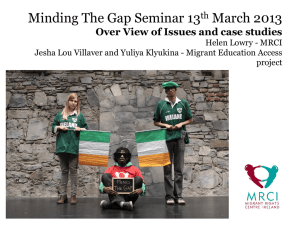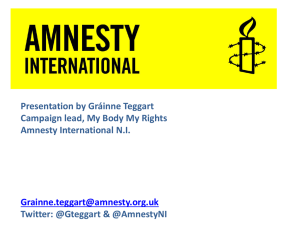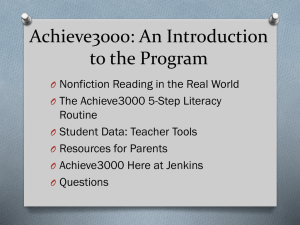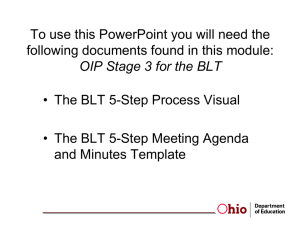Richard Velleman and Alex Copello
advertisement
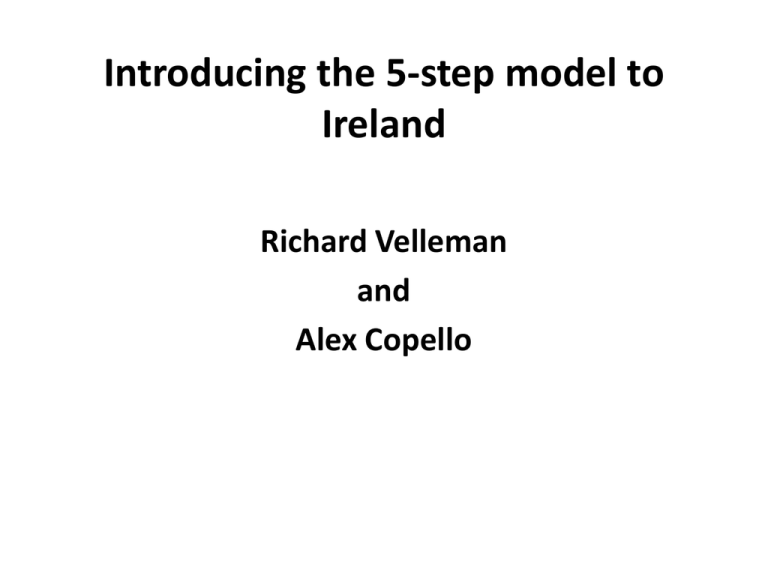
Introducing the 5-step model to Ireland Richard Velleman and Alex Copello 5-Step in Ireland In 2011 we were approached by the Family Support Network in Ireland (FSN http://www.fsn.ie/), an NGO which supports the development of Family Support Groups and Networks across all of Ireland. They had read about our work and wanted to use it across Ireland FSN are autonomous and non-judgemental, their aim is to improve the situation of families coping with substance misuse by: • developing, supporting and reinforcing the work of family support groups and regional family support networks, • working for positive change in policy and practice and • raising public awareness about the problem of drugs for families and communities, They have a strong community development ethos, and are committed to promoting the empowerment, inclusion and participation of Family Members. We felt that this fitted well with our ideas within the ADF Group and how we think about 5-Step. We were impressed with the emphasis on working over a sustained period of time and commitment to robust evaluation of the work. 5-Step in Ireland Two of them (Sadie Grace, CEO, and Megan O’Leary, Development Officer) came over to meet us, we held discussions over a period of time, and Megan attended our ADF International meeting in York in November 2011. Over the course of this time, we developed ‘A Plan’: - it sounds clear, but in reality, it is something that we gradually worked out, incrementally • • • • • • • • Train a group of practitioners in Ireland to do 5-Step Get them to implement it, and record their sessions We develop a way of assessing their competence and assess them Once they reach competence, we train them to train others Trained practitioners then train these others, who then get assessed, and once competent, they deliver 5-Step across Ireland. They develop peer-supervision, and we run refresher courses and tweak their competencies. We co-train others as trainers, who continue the model. Soon, Ireland only needs us to do a once/year refresher and tweaking session. The model • So our emphasis was from the start on training as a way of helping FSN to develop their own capacity to continue to deliver and develop implementation of the 5-step across Ireland with minimal support from us in the long term • Contrast to other pyramid models where reliance on the experts is encouraged and maintained 5-Step in Ireland Where we have got to • We have trained a group of 12 practitioners in Ireland to do 5-Step. • They implemented 5-Step, with (an) individual and in (a) group, and they audiorecorded their sessions. • We developed a way of assessing their competence and of assessing them. • Some have reached competence, others have not. But we have run a further training course, training them to train others. [We are here] 5-Step in Ireland • • • • • Issues arising Length of time to assess (5 x 1 hour) x 12 potential trainers = 60 hours x 2 or 3 raters = 120-180 hours [x 10 trainees each = 1200-1800 hours!] Quality of Audio recordings; quality of written submissions (Work Report (see next page) and Log of Contacts (details of the person(s), nature and length of contacts etc) Assessment of Competence. Follow the lead of others. Who? Motivational Interviewing? (no central accreditation programmes in MI, although some people do offer them – not Bill Miller or Steve Rollnick. Pip Mason offers an Advanced MI Practitioner course, and will assess a tape if people submit one – half do) So – do it ourselves! Developing and using an Assessment of Competence measure. Decide on: • ?4? ?5? Key dimensions for each step (example, next page) • rating scale – 3 point? 5 point? [1 = Very Poor. 2 = Poor. 3 = Acceptable. 4 = Good. 5 = Excellent. Can use .5 scores as necessary e.g. 3.5] • Pass level? [Each section should mainly have 4’s/5s and not more than one score of 3.] Then have a 2nd table, for Counselling Skills – same scoring. 5-Step in Ireland Work Report: For each session, complete: • Preparation work completed. • Information learnt. • Level of engagement of family member (or members if this is for a group). • Aspects of the session that went well, including practitioner skills • Aspects of the session that could be improved, including practitioner skills • Information to research before next session 5-Step in Ireland 1 Step 1: Listen, reassure and explore concerns Length 1.1 Allow family member to describe situation and tell their story, listen to and ask about the FMs concerns and fears. Use Q as necessary after FM has given a general description. Summarise the situation to check if understood correctly. Acknowledge emotions being expressed. 2.5 1.2 Identify relevant stresses and how the FM has been affected. 3 1.3 Identify relevant stresses and how others have been affected. 3 1.4 Normalise the experience of FMs giving the FM an indication that they are not alone with their experiences. 3 1.5 Beginning of session - introduce 5 step, confidentiality, purpose of Step 1. Ending session - summarised the main FM issues, use of handbook and next steps. Practical issues of contact and date of next session. 1.6 Step 1: Total Score FM described their situation. Counsellor asked questions and listened but could have probed more to find out concerns and fears. Could have acknowledged emotions more. Needed to use more summarising - sometimes felt like a chat. Try to summarise at least every 10 mins and say: “have I understood correctly, the situation is…..” “I can hear you have been very upset and anxious….this is very normal to feel like this, given what you are experiencing” Asked towards end effect on FM, again this could have been focussed to identify exact stresses. Better to be more concrete eg “So your son’s alcohol use affects you due to x” “ You feel concerned as you worry about his health and you are not sleeping properly” Asked about general stresses. Needed to be more focussed to find out specifics. Very general and not really ask about how others affected. “So we have talked about how you are affected, are there other people in the family who have been affected” Normalised a bit giving own experience but again could have summarised more. “Your situation sounds very stressful and from having talked to quite a lot of family members, your feelings and reactions are very normal” 5-Step in Ireland • • • • Score: 1 = Very Poor. 2 = Poor. 3 = Acceptable. 4 = Good. 5 = Excellent. Can use .5 scores as necessary e.g. 3.5 Table 1: 5 Step Skills Pass Rate = Each section should mainly have 4’s/5s and not more than one score of 3. The total score should be a minimum of 14 for each section (As a percentage this is 70%). There may be unusual circumstances where someone fails on a section but where you still feel that they should pass overall - if so, add explanatory comments. Table 2: Counselling and Other Skills Pass Rate = 4 for each item. Again, if an item is not relevant (e.g. use of handbook for someone e.g. with literacy problems), it can be discounted. In summary at end, state Pass / Pass with reservations (state how needs to improve) / In Progress (this will mean that following feedback and training, there needs to be a resubmission of a tape for the relevant section/s). 5-Step in Ireland Issues arising (continued) • • • • • • • Individual and Group 5-Step = deceptively simple Trainer-Assessment. Self-Assessment. PeerAssessment Cost of ratings Appeals process Generic skills versus specific skills Context of the delivery of 5-Step and the importance of non-specific factors 5-Step in Ireland Key points for accreditation Individual report (person details and contacts) Work report log (reflect on work carried out and what needed for next session) Record session. (volume) Self assess against criteria - see handout Experienced colleague to assess against criteria Submit to assessor only when self/colleague pass Upload onto Drop box Assessor reviews against criteria Assessment sheet returned to counsellor Can resubmit steps that do not pass and be reassessed 5-Step in Ireland Conclusions Exciting development Challenging to work out Assessment of competence, Fidelity to 5-Steps, plus Accreditation, all in one go and one process FSN are great to work with, and hence challenges become solvable (very different experience to other National organisations we have worked with!) Reaffirms how helpful the 5-Step method is to so many family members
